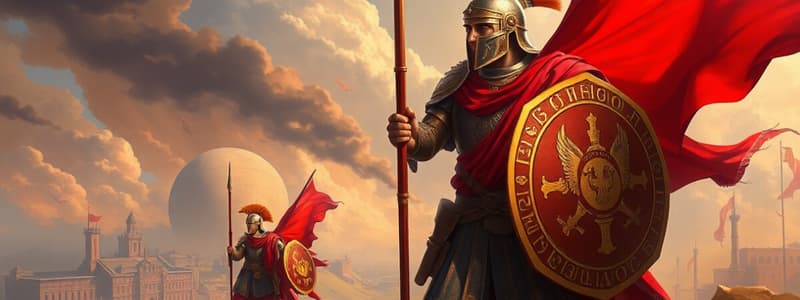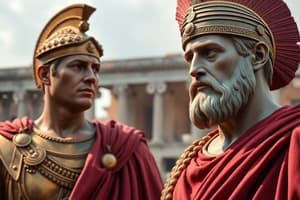Podcast
Questions and Answers
What significant role did Romulus play in the founding of Rome?
What significant role did Romulus play in the founding of Rome?
Romulus founded Rome on the Palatine Hill and welcomed outcasts and criminals to his city.
How did early Roman warfare differ from that of other cultures in Italy?
How did early Roman warfare differ from that of other cultures in Italy?
Early Roman warfare was loosely organized, but they distinguished themselves by establishing permanent relationships with defeated towns.
What was the outcome of the Punic Wars for Rome?
What was the outcome of the Punic Wars for Rome?
The Punic Wars resulted in the destruction of Carthage in 146 BC, marking a significant turning point for the Roman Empire.
In what ways did Roman culture incorporate influences from Greek mythology?
In what ways did Roman culture incorporate influences from Greek mythology?
What motivated the Romans to develop a system of alliances during their expansion?
What motivated the Romans to develop a system of alliances during their expansion?
Why was the Mediterranean Sea crucial for the Roman Empire?
Why was the Mediterranean Sea crucial for the Roman Empire?
How did Pompey the Great's campaign against pirates impact Roman society?
How did Pompey the Great's campaign against pirates impact Roman society?
How did Roman coinage reflect their attitudes toward alliances?
How did Roman coinage reflect their attitudes toward alliances?
What structural innovations did Pompey introduce to Roman architecture?
What structural innovations did Pompey introduce to Roman architecture?
What was one of the challenges faced by the Romans in controlling the Mediterranean?
What was one of the challenges faced by the Romans in controlling the Mediterranean?
What key action did Caesar take that triggered a civil war in Rome?
What key action did Caesar take that triggered a civil war in Rome?
How did Augustus contribute to the notion of peace within the Roman Empire?
How did Augustus contribute to the notion of peace within the Roman Empire?
Which ancient epic recounts Aeneas's journey from Troy to Italy?
Which ancient epic recounts Aeneas's journey from Troy to Italy?
What does Augustus's epitaph suggest about the role of a Roman Emperor?
What does Augustus's epitaph suggest about the role of a Roman Emperor?
How does the story of Aeneas depict the complexities of the Roman Empire's foundation?
How does the story of Aeneas depict the complexities of the Roman Empire's foundation?
What significant event followed Julius Caesar's assassination?
What significant event followed Julius Caesar's assassination?
What military strategy did Caesar employ during the battle at Alesia?
What military strategy did Caesar employ during the battle at Alesia?
What was Scipio Barbatus's perspective on the Roman Empire in the 3rd century BC?
What was Scipio Barbatus's perspective on the Roman Empire in the 3rd century BC?
How did the Roman Empire facilitate connections between its regions?
How did the Roman Empire facilitate connections between its regions?
What role did Pompey play in the early struggles for power before Caesar?
What role did Pompey play in the early struggles for power before Caesar?
Flashcards are hidden until you start studying
Study Notes
The Origins of the Roman Empire
- The story of Romulus and Remus, the twins suckled by a wolf, is a key mythical story that provides insight into Roman beliefs and values.
- Romulus founded Rome on the Palatine Hill, welcoming outcasts and criminals to his city.
- Rome’s first war was against the Sabines, who sought revenge for the abduction of their women by Roman men.
- The Romans developed a system of alliances that allowed them to establish control over the Italian peninsula.
Rise of Roman Dominance
- The Roman Empire’s expansion reached the Mediterranean Sea, resulting in a maritime rivalry with Carthage.
- The Romans established a network of allies and incorporated conquered foes into their empire.
- Early Italian warfare was loosely organized. The Romans distinguished themselves by:
- Creating permanent relationships with defeated towns.
- Demanding conquered towns provide troops for the Roman army.
Coinage and Conquests
- Roman coins depict scenes of oath taking, demonstrating their commitment to alliances.
- Rome’s expansion beyond Italy involved a series of conflicts leading to dominance over Sicily.
- The Punic Wars (Rome vs. Carthage) led to the destruction of Carthage in 146 BC, marking a significant turning point for Rome.
Roman Culture and Influence
- Roman conquests brought Greek culture to Rome, which left a lasting impact on Roman art, literature, and architecture.
- The Romans embraced Greek mythology, incorporating Aeneas, a Trojan hero from The Iliad, into their origin story.
- Despite the influence of Greece, Rome’s cultural identity was debated, with some Roman leaders fearing Greek influence.
- The Mediterranean Sea became crucial for the Romans.
- It facilitated trade and communication but also presented challenges, such as piracy.
The Impact of Slavery
- Rome’s conquests generated a large slave trade, with Delos being a significant slave market.
- The Romans sought to control pirates through military campaigns, but this action led to the granting of immense powers to Pompey the Great.
- Pompey’s successful campaign against pirates led to a massive parade and celebration, with a display of conquered riches and prisoners.
Roman History
- The Roman Empire was traditionally governed by Democratic officials who served for only a year, a system intended to prevent the rise of a king or emperor.
- Pompey revolutionized Roman architecture with his theater in Rome, which was a massive semi-circular auditorium.
- The Roman Empire was founded by Julius Caesar who was a rival to Pompey.
- Pompey conquered the East and returned to Rome with great wealth.
- Caesar, to rival Pompey, conquered the West.
- Both Pompey and Caesar wrote about their victories.
- During Caesar's conquest of Gaul, he writes about the battle at Alesia in which the army of Gauls set up camp on a hill, Caesar describes the battle in complete control.
- The Gauls were eventually defeated by Caesar and Caesar boasted about the number of Gauls killed in the conquest, modern estimates suggest that around a million Gauls were killed.
- Caesar was very loyal to his troops and in return, his troops were loyal to him.
- Caesar's army marched on Rome to seize control, once he crossed the Rubicon river, which marked the border of Gaul and Italy, a civil war broke out.
- Caesar won the civil war and was named dictator for life.
- Caesar was assassinated a few weeks after becoming dictator for life.
- Augustus, Caesar's adopted son, was named the first emperor of Rome.
- Augustus wrote his own epitaph which included how he extended the boundaries of the Roman Empire and how he pacified the provinces of Gaul and Spain.
- The message of Augustus's epitaph is that to be a Roman Emperor, you must be a conqueror.
- Augustus built the Altar of Peace, which is a monument dedicated to Pax, or peace, but it is not peace in the traditional modern sense, but peace that is won through fighting, and through victory.
- The Altar of Peace is covered with images of Augustus and his family, which projects the idea of a divine birthright.
- The origins of Rome are intertwined with the idea of foreigners, as Romulus welcomed outcasts and runaways to Rome, and Aeneas came from Troy.
- The Trojan War is the most famous war in classical history and myth with famous figures such as Helen, Achilles, and Hector, it also marks the beginning of the Augustine age with the Roman poet Virgil.
- Virgil wrote the Aeneid, which recounts the journey of Aeneas from Troy to Italy.
- At the end of the Aeneid, Aeneas kills an enemy soldier who has surrendered, which shows the brutality of the Empire.
- Aeneas's journey was a gift from the gods, which also highlights the potential brutality of the Empire.
- Scipio Barbatus, during the 3rd century BC, was a Roman who could not have grasped the concept of a limitless empire.
- The beginning of the Roman Empire was an unexpected development, which eventually led to an Empire with limitless boundaries.
- The Roman Empire used a system of resources, landscapes, and people to fuel the Empire, which connected the various parts of the empire through a massive road network.
- The Colosseum was built by Augustus.
Origins of Rome
- Romulus and Remus are the mythical founders of Rome.
- Rome’s first war was against the Sabines who were retaliating against an abduction of their women.
- The Romans created an alliance system to control the Italian peninsula.
Roman Dominance
- The Roman Empire expanded to the Mediterranean Sea and established a vast network of allies and conquered foes.
- Roman coins depicted oath taking, demonstrating commitment to alliances.
Coinage and Conquests
- The Punic Wars were fought between Rome and Carthage, resulting in the destruction of Carthage in 146 BC.
- Roman expansion extended beyond Italy, leading to dominance over Sicily.
Roman Culture
- Greek culture significantly impacted Roman art, literature, and architecture.
- Aeneas, a Trojan hero from The Iliad, was incorporated into Roman origin stories.
- The Mediterranean Sea was crucial for trade and communication but presented challenges like piracy.
Slavery
- Rome experienced a large slave trade with Delos being a major slave market.
- Pompey the Great, who led Roman campaigns against pirates, accumulated significant power.
Roman History
- The Roman Empire initially had Democratic officials with annual terms to prevent the rise of an emperor.
- Julius Caesar, a rival of Pompey, conquered the West, while Pompey conquered the East.
- Caesar was eventually assassinated after being named dictator for life.
- Augustus, Caesar’s adopted son, became the first emperor of Rome.
- Augustus described himself as a conqueror and boasted of expanding the Roman Empire.
- The Altar of Peace, built by Augustus, highlights a Roman ideology of peace achieved through conquest.
- Virgil’s The Aeneid recounts Aeneas's journey from Troy to Italy, highlighting the Empire's potential for both peace and brutality.
- Scipio Barbatus in the 3rd century BC couldn't fathom the concept of a boundless empire.
- The Roman Empire used resources, landscapes, and people to fuel its expansion, connecting different regions through roads.
Construction in Rome
- Pompey built a massive theater in Rome, revolutionizing Roman architecture.
- The Colosseum was built by Augustus.
Studying That Suits You
Use AI to generate personalized quizzes and flashcards to suit your learning preferences.




